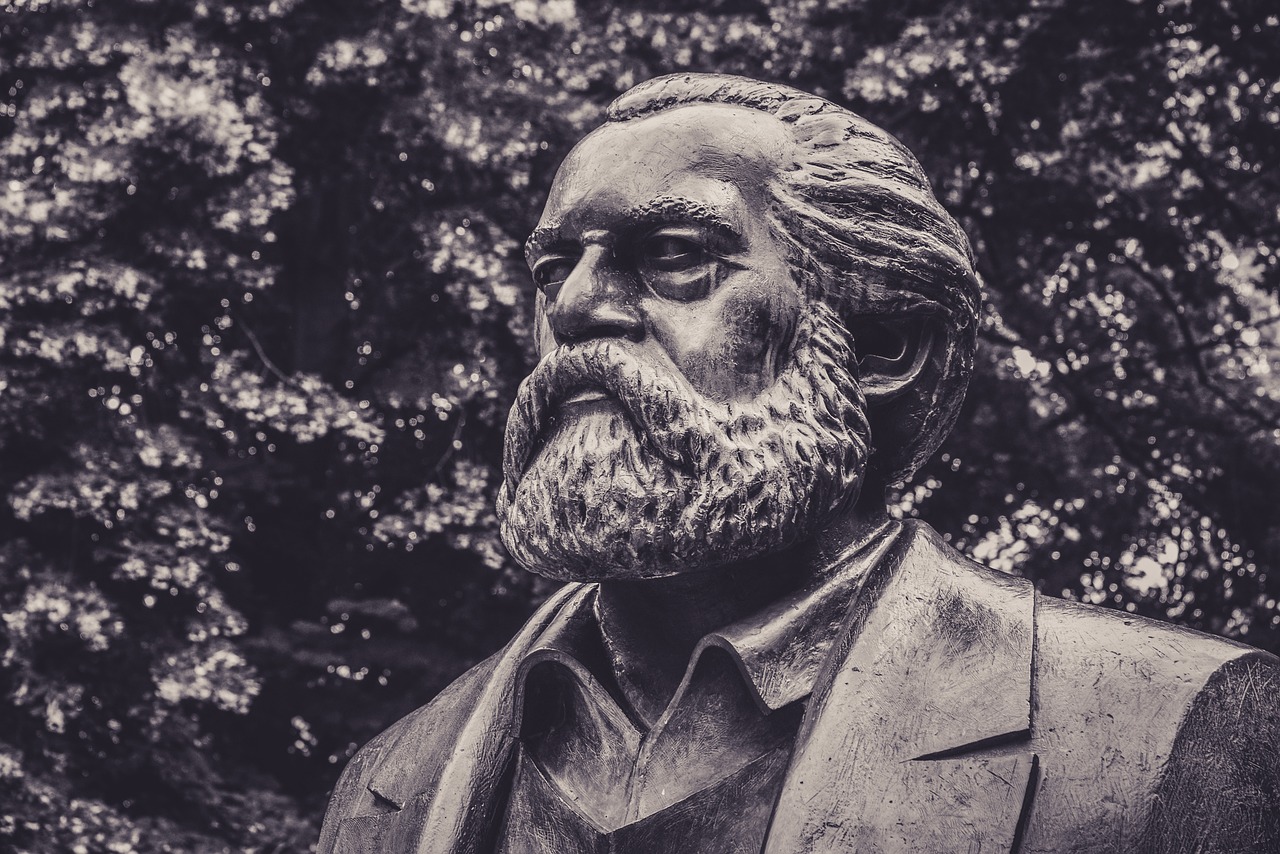Understanding Karl Marx's Philosophical Perspectives
Karl Marx, a name that resonates through the corridors of history, is often associated with revolutionary ideas that challenge the very fabric of society. His philosophical perspectives offer a profound critique of capitalism and an insightful analysis of social structures. But what exactly did he propose, and why do his ideas still matter today? This article delves into the core philosophical ideas of Marx, examining his thoughts on society, economics, and politics. By doing so, we aim to uncover how these ideas continue to influence contemporary discussions on class, capitalism, and social change.
Marx's philosophy isn't just a collection of abstract thoughts; it's a framework that seeks to explain the world around us. Imagine trying to understand a complex machine by only looking at its surface. Marx invites us to look deeper, to examine the gears and levers that drive societal change. His work encourages us to question the status quo and consider how economic systems shape our lives and relationships. In a world where inequality and exploitation persist, Marx's insights become even more relevant, prompting us to ask: Are we truly free, or are we merely products of our economic conditions?
To grasp the full impact of Marx's ideas, we must first explore the historical context in which he wrote. The 19th century was a time of immense change, marked by the rise of industrial capitalism and the stark contrasts between the wealthy elite and the working class. This backdrop not only influenced Marx's thoughts but also fueled his passion for social justice. As we journey through his key concepts, such as dialectical materialism and class struggle, we'll see how they provide a lens through which to view the ongoing struggles for equality and justice in our modern world.
In this exploration, we'll also highlight the contradictions within capitalism that Marx identified, which he believed would ultimately lead to its downfall. Through a detailed examination of alienation, ideology, and the revolutionary potential of the working class, we aim to paint a comprehensive picture of Marx's philosophical legacy. So, strap in and get ready to embark on a thought-provoking journey through the mind of one of history's most influential thinkers.
- What is Marx's main contribution to philosophy? Marx's main contribution lies in his critique of capitalism and his analysis of class struggle, which he believed was the driving force of historical development.
- How does Marx view capitalism? Marx views capitalism as an economic system that inherently leads to inequality and exploitation, ultimately resulting in social conflict.
- What is alienation according to Marx? Alienation refers to the disconnection that workers feel from the products of their labor, their fellow workers, and their own human potential in a capitalist society.
- Why are Marx's ideas still relevant today? Marx's ideas remain relevant as they provide critical insights into modern social issues, including economic inequality, labor rights, and the impact of capitalism on society.

The Historical Context of Marx's Philosophy
To truly understand Karl Marx's philosophical perspectives, one must delve into the rich and tumultuous historical backdrop of 19th-century Europe. This was a period marked by rapid industrialization, political upheaval, and social transformation. Imagine a landscape where the echoes of revolution resonated through the streets, and the air was thick with the aspirations of the working class. The Industrial Revolution had fundamentally altered the fabric of society, shifting populations from rural agrarian lifestyles to urban centers where factories dominated the scene. This migration not only changed where people lived but also how they lived, leading to a new class structure that Marx would later analyze so profoundly.
During Marx's lifetime, Europe was witnessing significant changes. The feudal systems that had long governed social relations were crumbling, giving way to capitalist economies that prioritized profit over people. The rise of the bourgeoisie, or the capitalist class, created a stark contrast with the proletariat, or working class, leading to a palpable tension that Marx keenly observed. In cities like Paris and London, workers toiled under harsh conditions for meager wages, often living in overcrowded and unsanitary conditions. This stark reality fueled Marx's belief that the capitalist system was inherently exploitative and unsustainable.
Moreover, the political landscape was equally dynamic. The revolutions of 1848, known as the "Springtime of Nations," swept across Europe, challenging the established order and advocating for democratic reforms. Marx was deeply influenced by these events, recognizing that the struggles of the working class were not just economic but also political. He saw an opportunity for revolutionary change that could dismantle the oppressive structures of capitalism and lead to a more equitable society. In this context, Marx's ideas began to take shape, as he sought to articulate a philosophy that could explain and address the injustices he witnessed.
In the midst of this upheaval, Marx was also influenced by various philosophical currents of his time. Hegelian dialectics, which emphasized the process of change through contradictions, played a significant role in shaping his thoughts. However, Marx diverged from Hegel's idealism, grounding his philosophy in material conditions rather than abstract ideas. This shift marked the birth of dialectical materialism, a framework that would become central to his critique of society and capitalism.
In summary, the historical context of Marx's philosophy is crucial for understanding his revolutionary ideas. The interplay of industrialization, class struggle, and political movements in 19th-century Europe provided the fertile ground from which his thoughts emerged. By examining this backdrop, we can appreciate how Marx's insights continue to resonate in contemporary discussions about class, capitalism, and social justice.
- What was the Industrial Revolution's impact on Marx's philosophy?
The Industrial Revolution significantly influenced Marx's thoughts on capitalism and class struggle, as it created stark economic inequalities and transformed social relations.
- How did political events shape Marx's ideas?
Political upheavals, particularly the revolutions of 1848, inspired Marx to advocate for revolutionary change and a classless society.
- What is dialectical materialism?
Dialectical materialism is a philosophical approach that emphasizes the importance of material conditions in shaping society, contrasting with idealist philosophies that prioritize ideas.

Key Concepts in Marx's Thought
To truly grasp the essence of Karl Marx's philosophy, one must dive into several key concepts that serve as the backbone of his revolutionary ideas. These concepts are not just abstract theories; they provide a lens through which we can analyze and understand the complexities of society, economics, and politics. At the heart of Marx's thought lies materialism, which posits that the material conditions of life significantly shape human consciousness and societal structures. This stands in stark contrast to idealist philosophies that prioritize ideas over the tangible realities of existence.
One of the most fundamental ideas in Marx's philosophy is dialectical materialism. This framework emphasizes that history is not a linear progression but rather a complex interplay of contradictions and conflicts. Through this lens, Marx argues that societal change is driven by material conditions rather than merely the evolution of ideas. For instance, consider the way technological advancements have transformed labor practices; these shifts are rooted in material changes rather than just ideological shifts.
At the core of dialectical materialism is the understanding that contradictions within society fuel its development. Marx believed that every society contains inherent contradictions that push it towards change. For example, within capitalism, there exists a fundamental conflict between labor and capital. Workers sell their labor to capitalists, yet the capitalists seek to maximize profit by minimizing labor costs. This ongoing struggle creates tension that Marx argues will eventually lead to revolutionary change.
Marx's assertion that material conditions drive social change challenges the notion that ideas alone shape human history. He believed that it is the economic base of society—the forces and relations of production—that determines its superstructure, which includes culture, politics, and ideology. For instance, in a capitalist society, the economic imperative to generate profit influences everything from government policies to social norms. This perspective encourages us to examine the underlying economic structures when analyzing social issues.
Marx identified several inherent contradictions within capitalism that he believed would lead to its eventual downfall. For example, as capitalists seek to maximize profits, they often exploit workers, resulting in a widening gap between the rich and the poor. This exploitation breeds discontent among the working class, creating a fertile ground for revolutionary ideas. Additionally, the drive for constant growth in a finite world leads to environmental degradation, highlighting the unsustainable nature of capitalist practices.
Central to Marx's philosophy is the idea of class struggle. He posits that history is marked by conflicts between different social classes. This struggle is not merely a historical phenomenon but a continual process that shapes human experience. Marx believed that as the working class becomes increasingly aware of their exploitation, they will rise up against their oppressors, leading to revolutionary change. The ultimate goal of this struggle is the establishment of a classless society, where resources and power are shared equitably among all individuals.
In summary, understanding these key concepts in Marx's thought is essential for anyone looking to engage deeply with his ideas. They provide a framework for analyzing not just the past but also the present and future of our societies. As we navigate the complexities of modern capitalism, the insights offered by Marx continue to resonate, prompting us to question the systems that govern our lives.
- What is dialectical materialism? - It is a philosophical approach that emphasizes the importance of material conditions in shaping society and history.
- How does Marx view class struggle? - Marx sees class struggle as the driving force of history, leading to social change and revolution.
- What are the contradictions of capitalism according to Marx? - Marx identifies conflicts such as the exploitation of labor and the widening gap between rich and poor as inherent contradictions that could lead to capitalism's downfall.

Dialectical Materialism
Dialectical materialism is not just a fancy term; it's the very bedrock of Karl Marx's philosophical approach. At its core, this concept emphasizes the significance of material conditions in shaping human society and history. Imagine trying to build a house without a solid foundation; that’s what ignoring material conditions would be like in understanding societal development. Unlike idealist philosophies that prioritize abstract ideas, dialectical materialism roots itself in the tangible, the real-world circumstances that influence how societies evolve over time.
To break it down further, dialectical materialism combines two critical elements: dialectics and materialism. Dialectics refers to the process of change through contradictions and conflicts, while materialism focuses on the physical and economic aspects of life. Together, they create a dynamic framework for analyzing how societies transform. For Marx, history is alive, constantly moving, and driven by the struggles between opposing forces, particularly in the realm of class relations. It’s like a never-ending dance, where every step forward is a response to the tensions and contradictions inherent in the social fabric.
One of the most compelling aspects of dialectical materialism is its insistence that change is inevitable. Just as nature evolves, so too do societies. Marx argued that the material conditions of a society—its economic structure, class relations, and productive forces—are what ultimately drive historical change. To illustrate, consider how the Industrial Revolution transformed agrarian societies into industrial powerhouses. This shift wasn’t merely a result of new ideas; it was fundamentally about new material realities that altered the social landscape.
Furthermore, Marx pinpointed several contradictions within capitalism that exemplify dialectical materialism in action. Capitalism, with its focus on profit and competition, creates inherent tensions between labor and capital. Workers are often exploited for their labor, leading to class struggles that challenge the status quo. This conflict is not just a hiccup in the system; it’s a driving force that can lead to revolutionary change. In this sense, dialectical materialism offers a lens through which we can understand not only the past but also the potential futures of societies.
In summary, dialectical materialism provides a robust framework for analyzing the complexities of societal development. By focusing on the interplay between material conditions and social change, Marx encourages us to look beyond mere ideas and to consider the concrete realities that shape our world. It’s a reminder that to understand society, one must first understand the material conditions that underpin it—because after all, ideas don’t exist in a vacuum; they are birthed from the struggles and triumphs of real human beings.
- What is dialectical materialism?
Dialectical materialism is a philosophical approach developed by Karl Marx that emphasizes the role of material conditions in shaping society and history, contrasting with idealist philosophies that prioritize abstract ideas. - How does dialectical materialism explain social change?
It posits that social change occurs through contradictions and conflicts within material conditions, particularly in the realm of class relations and economic structures. - Why is dialectical materialism important?
It provides a framework for understanding the dynamics of societal development and the inevitable changes driven by conflicts between opposing forces, especially in capitalist societies.

Material Conditions and Social Change
When we talk about material conditions in society, we're diving deep into the very fabric that shapes our lives—things like the economy, technology, and the physical environment around us. Karl Marx believed that these material conditions are not just backdrops to human activity; they are the driving forces behind social change. Imagine trying to bake a cake without flour or eggs; you simply can't. Similarly, without adequate material conditions, societal progress becomes stunted. Marx argued that the economic base of a society, which includes the means of production and the relationships between different classes, fundamentally influences its superstructure—everything from culture and politics to ideology.
For Marx, history is a story of change driven by these material conditions. He posited that as the means of production evolve, so too do the social relations surrounding them. For instance, the transition from feudalism to capitalism was not merely a shift in who held power; it was a transformation rooted in the changing material conditions of society. The rise of industrialization created new classes—the bourgeoisie and the proletariat—each with conflicting interests that would eventually lead to class struggles and revolutions.
To illustrate this point, consider the following table that outlines how different material conditions can lead to various social structures:
| Material Condition | Social Structure | Potential for Change |
|---|---|---|
| Agricultural Economy | Feudalism | Limited; largely static |
| Industrial Economy | Capitalism | High; class conflict emerges |
| Post-Industrial Economy | Information Society | Potential for new forms of social organization |
As the table suggests, each shift in material conditions can lead to significant changes in social structures. The conflicts that arise from these shifts are not merely incidental; they are essential for progress. Marx believed that understanding these dynamics is crucial for anyone looking to grasp the complexities of societal change. It prompts us to ask questions like: How do our current economic conditions shape our social interactions? Are we, as a society, ready for the changes that new technologies and economic models bring? These inquiries are not just academic; they resonate with our lived experiences.
In essence, Marx's emphasis on material conditions as the bedrock of social change invites us to reconsider our own realities. It challenges us to look beyond abstract ideas and focus on the tangible factors that influence our lives. By doing so, we can better understand the world around us and the forces that propel us toward change. So, the next time you ponder societal issues, remember that the roots often lie in the material conditions we inhabit. They are the unsung heroes of history, quietly shaping our destinies while we chase after lofty ideals.
- What are material conditions? Material conditions refer to the economic, social, and physical factors that shape a society.
- How do material conditions influence social change? They drive the evolution of social structures and relationships, leading to conflicts and ultimately societal transformations.
- Can material conditions be changed? Yes, through collective action, policy changes, and technological advancements, material conditions can evolve, prompting social change.

Contradictions in Capitalism
Capitalism, while often hailed as a beacon of progress and innovation, is riddled with contradictions that reveal its inherent instability. Karl Marx meticulously dissected these inconsistencies, arguing that they are not merely flaws but fundamental aspects of the capitalist system itself. One of the most glaring contradictions lies in the relationship between labor and capital. On one hand, capitalists rely on labor to produce goods and generate profit; on the other hand, they seek to minimize labor costs to maximize their profits. This creates a perpetual conflict, as workers demand fair wages and better working conditions, while capitalists aim to reduce expenses. It's a classic case of the rich getting richer at the expense of the poor becoming poorer.
Another contradiction arises from the notion of competition. In theory, capitalism promotes competition, which should ideally lead to better products and services at lower prices. However, in practice, this often results in monopolies and oligopolies, where a few powerful players dominate the market. This concentration of wealth and power stifles innovation and limits consumer choice, contradicting the very principles that capitalism purports to uphold. As Marx pointed out, the drive for profit leads capitalists to engage in practices that undermine the competitive landscape, creating barriers for new entrants and perpetuating inequality.
Moreover, capitalism thrives on the constant need for growth. Companies must continuously expand their markets and increase production to satisfy shareholders and remain viable. This relentless pursuit of growth can lead to environmental degradation, resource depletion, and social unrest. The contradiction here is stark: while capitalism promotes economic advancement, it often does so at the expense of the planet and the well-being of future generations. In this sense, Marx's critique resonates deeply today, as we grapple with climate change and the unsustainable practices of many corporations.
To illustrate these contradictions, let’s consider a simple table that outlines some of the key conflicts inherent in capitalism:
| Contradiction | Explanation |
|---|---|
| Labor vs. Capital | Workers seek fair compensation while capitalists aim to minimize labor costs. |
| Competition vs. Monopoly | While capitalism encourages competition, it often leads to monopolies that stifle market entry. |
| Growth vs. Sustainability | The need for constant growth can lead to environmental harm and resource depletion. |
Ultimately, these contradictions paint a complex picture of capitalism. Marx’s insights compel us to question the sustainability of a system that prioritizes profit over people and the planet. As we navigate the 21st century, understanding these contradictions becomes increasingly vital, especially as we seek to create a more equitable and sustainable world.
- What are the main contradictions in capitalism? The main contradictions include the conflict between labor and capital, the tendency towards monopolies despite the promotion of competition, and the unsustainable pursuit of growth that harms the environment.
- How did Marx view capitalism? Marx viewed capitalism as an exploitative system that inherently leads to inequality and class struggle, ultimately predicting its downfall due to its internal contradictions.
- Why is understanding Marx's critique of capitalism important today? Understanding Marx's critique helps us analyze contemporary issues related to inequality, environmental sustainability, and the concentration of power in the hands of a few.

Class Struggle and Revolution
The concept of class struggle is at the very heart of Karl Marx's philosophical framework. He believed that history is not just a series of events but rather a dynamic interplay of conflicts between different social classes. From the feudal lords and serfs of the Middle Ages to the bourgeoisie and proletariat of capitalism, Marx posited that every significant societal change stems from these class conflicts. It's almost like a never-ending tug-of-war, where each side pulls for their interests, often leading to societal upheaval and transformation.
Marx argued that the proletariat, or working class, is inherently exploited by the bourgeoisie, or capitalist class. This exploitation is not merely a matter of unfair wages; it is a systemic issue deeply embedded in the capitalist mode of production. The bourgeoisie controls the means of production, while the proletariat must sell their labor to survive, creating a power imbalance that is ripe for conflict. The struggle between these classes is not just economic; it is also social and political, as each class seeks to assert its dominance and reshape society according to its own interests.
In Marx's view, this class struggle is not only inevitable but also necessary for progress. He believed that as the proletariat becomes increasingly aware of their exploitation—what he termed class consciousness—they would rise up against their oppressors. This revolutionary potential is what Marx saw as the catalyst for a new, classless society. The transition from capitalism to socialism, and eventually to communism, is marked by this revolutionary struggle, where the working class would overthrow the capitalist system and establish a society based on collective ownership and equality.
To illustrate Marx's perspective on class struggle and revolution, consider the following table that summarizes the key stages of societal development according to his theory:
| Stage | Class Structure | Key Conflict | Outcome |
|---|---|---|---|
| Feudalism | Lords vs. Serfs | Exploitation of serfs | Rise of the bourgeoisie |
| Capitalism | Bourgeoisie vs. Proletariat | Exploitation of workers | Revolution leading to socialism |
| Socialism | Collective ownership | Class conflict subsides | Transition to communism |
| Communism | Classless society | N/A | Universal equality and freedom |
Marx’s vision of revolution is not just about violent upheaval; it is also about the awakening of the masses to their plight. He believed that when the proletariat recognizes their shared interests and unites against the bourgeoisie, they can dismantle the existing power structures. This unity is crucial, as it transforms individual grievances into a collective movement, capable of challenging the status quo. The revolution is, therefore, both a political and a social phenomenon, one that reshapes not only economic relations but also cultural and ideological frameworks.
In conclusion, class struggle and revolution are central to understanding Marx's critique of capitalism. They highlight the inherent conflicts within society and the potential for transformative change. Marx’s ideas continue to resonate today, as we witness various movements around the world advocating for social justice and equality. The struggle is ongoing, and the lessons learned from Marx's philosophy remain relevant as we navigate the complexities of modern class relations.
- What is class struggle? Class struggle refers to the conflict between different classes in society, particularly between the bourgeoisie and the proletariat in capitalist societies.
- How does Marx define revolution? For Marx, revolution is a fundamental change in the social order, driven by class struggle, leading to the overthrow of the ruling class and the establishment of a new system.
- Why is class consciousness important? Class consciousness is crucial because it enables the working class to recognize their shared interests and unite against their oppressors, paving the way for revolutionary change.

Marx's Critique of Capitalism
When we dive into , we're stepping into a profound examination of how economic systems shape human experience. Marx wasn't just a critic; he was a visionary who sought to unveil the underlying mechanics of capitalism that perpetuate inequality and exploitation. His analysis goes far beyond mere economic theory; it encompasses the social and political dimensions that interweave with the economic fabric of society.
At the heart of Marx's critique lies the assertion that capitalism is inherently flawed. He believed that the capitalist system is driven by the profit motive, which leads to the commodification of human relationships and the alienation of the worker from the fruits of their labor. This alienation manifests in various forms, including:
- Alienation from the product: Workers produce goods that they cannot afford, leading to a disconnect between their labor and the value it creates.
- Alienation from fellow workers: Competition for jobs and wages fosters isolation rather than solidarity among workers.
- Alienation from self: The repetitive and dehumanizing nature of labor under capitalism stifles individual creativity and potential.
Marx's analysis doesn't stop there; he delves into the role of ideology in maintaining the capitalist status quo. He argues that the dominant ideologies serve to justify and perpetuate existing power structures, effectively masking the harsh realities of exploitation and inequality. This creates a false consciousness among the working class, blinding them to their own oppression and the potential for revolutionary change. It's like a magician's trick—while the audience is mesmerized by the show, they fail to see the sleight of hand that keeps them in the dark.
In his view, capitalism is not just an economic system but a social order that fosters class conflict. The bourgeoisie, or the ruling class, profits from the labor of the proletariat, or the working class, creating a dynamic of perpetual struggle. Marx famously stated, “The history of all hitherto existing society is the history of class struggles.” This struggle is not just a backdrop; it is the driving force of historical development. As the contradictions of capitalism intensify—such as the widening gap between the rich and the poor—Marx believed that the conditions would be ripe for revolutionary change.
To further illustrate his critique, consider the following table that outlines key aspects of Marx's analysis:
| Aspect | Marx's Critique |
|---|---|
| Economic Inequality | Capitalism generates wealth for a few while impoverishing the many. |
| Exploitation | Workers are paid less than the value they produce, leading to surplus value for capitalists. |
| Social Alienation | Workers become estranged from their labor, each other, and their own humanity. |
| Class Struggle | Conflict between the bourgeoisie and proletariat drives historical change. |
In summary, Marx's critique of capitalism is a multifaceted exploration of how economic systems shape human relationships and societal structures. His insights remain relevant today, as we continue to grapple with issues of inequality and exploitation in our modern world. Understanding his perspective allows us to critically evaluate the systems we live in and envision a future where social justice prevails.
- What is the main idea behind Marx's critique of capitalism?
Marx argues that capitalism is fundamentally exploitative, leading to inequality and alienation among workers. - How does alienation manifest in capitalist societies?
Alienation occurs when workers feel disconnected from the products they create, their fellow workers, and their own potential. - What role does ideology play in capitalism according to Marx?
Ideology serves to justify and maintain existing power structures, often obscuring the realities of exploitation.

Alienation in Capitalist Society
Alienation, a core concept in Marx's critique of capitalism, refers to the profound disconnection individuals experience in a system that prioritizes profit over human connection and fulfillment. In capitalist societies, workers often find themselves estranged from the products of their labor, leading to a sense of powerlessness and disenchantment. Imagine putting your heart and soul into a piece of art, only to have it sold for a price that barely covers your expenses—this is the reality for many workers who toil away in factories or offices, producing goods that they will never own or fully appreciate.
Marx argues that this alienation manifests in several significant ways:
- Alienation from the Product: Workers do not own what they produce; instead, the fruits of their labor are appropriated by capitalists, leading to a disconnect between the worker and the product.
- Alienation from the Process: The repetitive, mechanized nature of labor in capitalist systems strips work of its creativity and individuality, reducing human beings to mere cogs in a vast machine.
- Alienation from Fellow Workers: Competition among workers fosters isolation rather than camaraderie, as individuals are pitted against each other in a relentless quest for job security and advancement.
- Alienation from Self: Ultimately, this disconnection leads to a loss of personal identity and potential. Workers become estranged from their own humanity, as their work does not reflect their true selves or aspirations.
To illustrate the impact of alienation, consider a factory worker who spends long hours assembling products on a production line. Each day, they perform the same monotonous tasks, with little understanding or connection to the final product. This disconnection not only diminishes their sense of purpose but also contributes to a broader societal issue—where individuals feel like mere commodities, valued only for their labor, rather than as whole human beings with dreams and desires.
Marx believed that such alienation is not just a personal issue but a systemic one rooted in the very fabric of capitalist society. The capitalist system thrives on this alienation, as it allows for greater control and exploitation of the workforce. The irony is that while capitalism claims to promote freedom and individualism, it often results in the exact opposite: a society where individuals are trapped in roles that deny their true potential.
In this context, the fight against alienation becomes a fight for recognition, dignity, and a return to meaningful work. Marx envisioned a revolutionary change that would lead to a society where individuals could reconnect with their labor, their community, and ultimately, themselves. The challenge remains: how can we create a world where work is not just a means to an end but a fulfilling expression of our humanity?
- What is alienation in the context of Marx's philosophy?
Alienation refers to the estrangement individuals feel in a capitalist society, where they become disconnected from the products of their labor, the work process, their fellow workers, and their own sense of self. - How does alienation affect workers?
Alienation can lead to feelings of powerlessness, dissatisfaction, and a lack of fulfillment, as workers often feel like mere commodities rather than valued individuals. - Can alienation be overcome?
Marx believed that overcoming alienation requires a revolutionary change in society, where individuals can reclaim their labor and experience meaningful work that reflects their true selves.

The Role of Ideology
When we dive into Marx's philosophy, we quickly realize that ideology plays a crucial role in shaping society. Marx argued that the prevailing ideologies are not just mere thoughts floating around; they are powerful tools that serve to justify and maintain the existing social order. Think of ideology as a lens through which people view their world. It colors their perceptions, beliefs, and even their actions. This lens is often manipulated by those in power to ensure their dominance remains unchallenged.
Marx was particularly concerned about how dominant ideologies mask the harsh realities of exploitation and inequality. For instance, in a capitalist society, the idea that anyone can achieve success through hard work is a prevalent ideology. This notion, while motivating, often overlooks the systemic barriers that prevent many from climbing the social ladder. In essence, it creates a false sense of meritocracy. This is where Marx's critique becomes powerful; he believed that ideologies like this serve to distract the working class from the true nature of their oppression.
Moreover, Marx identified that ideologies are not static; they evolve alongside the material conditions of society. As economic systems change, so do the ideologies that support them. For example, during the rise of industrial capitalism, ideologies shifted to promote individualism and competition, reflecting the new economic realities. This adaptability of ideology makes it a formidable force in maintaining the status quo. To illustrate this point, let's consider a simple table that outlines various ideologies and their corresponding societal impacts:
| Ideology | Societal Impact |
|---|---|
| Capitalism | Promotes individual success, often at the expense of collective well-being. |
| Socialism | Advocates for collective ownership, aiming to reduce inequality. |
| Liberalism | Emphasizes personal freedom and equal rights, but can obscure systemic inequalities. |
In conclusion, the role of ideology in Marx's thought is multifaceted and deeply intertwined with the fabric of society. It not only shapes individual beliefs but also reinforces the power dynamics that exist within social structures. By critically examining the ideologies that dominate our lives, we can begin to uncover the underlying truths about our societal conditions. This awareness is the first step towards challenging the status quo and striving for a more equitable society.
- What is the main argument of Marx regarding ideology?
Marx argues that dominant ideologies serve to justify and perpetuate existing power structures, masking the realities of exploitation and inequality. - How does ideology affect social change?
Ideology influences how individuals perceive their circumstances, which can either hinder or promote social change depending on whether it challenges or supports the status quo. - Can ideologies change over time?
Yes, ideologies evolve alongside material conditions in society, adapting to reflect new economic and social realities.

Marx's Influence on Modern Thought
When we talk about Marx's influence on modern thought, we're diving into a vast ocean of ideas that have rippled through various disciplines. His critiques of capitalism and class structures have not only sparked debates but have also ignited movements across the globe. From sociology to political science, the echoes of Marx's theories are still very much alive today. So, what exactly has Marx contributed to our understanding of society?
First off, let's consider how Marx's ideas have shaped sociology. His analysis of class struggle and the dynamics of power relations laid the groundwork for many sociological theories. Scholars like Max Weber and Émile Durkheim built upon Marx's foundation, exploring the complexities of social structures. Marx's emphasis on the material conditions of life has led sociologists to investigate how economic factors influence social behavior and relationships. This perspective is particularly relevant today, as we observe growing inequalities and their societal impacts.
In the realm of political science, Marx's critique of capitalism has inspired numerous political movements advocating for social justice. His ideas have fueled the rise of various socialist and communist movements worldwide, each interpreting his work in different contexts. For instance, the Bolshevik Revolution in Russia was heavily influenced by Marxist theory, aiming to dismantle the capitalist system and establish a classless society. Even contemporary political discussions around wealth redistribution and universal basic income draw upon Marxist principles, challenging the status quo.
Moreover, Marx's thoughts on ideology have been pivotal in understanding how cultural narratives shape societal norms. He argued that dominant ideologies serve to justify existing power structures, often obscuring the realities of exploitation. This concept has been further developed by critical theorists, such as those from the Frankfurt School, who examine how media and culture can perpetuate social inequalities. In today's world, where information is constantly disseminated through various channels, understanding the role of ideology is more crucial than ever.
To illustrate Marx's enduring impact, consider the following table that highlights key areas influenced by his philosophy:
| Field | Influence |
|---|---|
| Sociology | Foundation for class analysis and social behavior studies. |
| Political Science | Inspiration for socialist movements and critiques of capitalism. |
| Economics | Critique of capitalist economic systems and exploration of alternatives. |
| Cultural Studies | Analysis of ideology and its role in maintaining power dynamics. |
Lastly, it's essential to recognize that Marx's influence transcends academia. His ideas have permeated popular culture, inspiring literature, art, and film that critique capitalist society. From the writings of George Orwell to films like Parasite, the themes of class struggle and social inequality resonate deeply with audiences, reflecting the ongoing relevance of Marx's thoughts.
In conclusion, Marx's philosophical perspectives continue to challenge and inspire modern thought across various disciplines. His critiques of capitalism, insights into class struggle, and understanding of ideology remain vital as we navigate today's complex social landscape. As we face growing inequalities and systemic injustices, revisiting Marx's ideas may offer valuable frameworks for envisioning a more equitable future.
- What is the main idea behind Marx's philosophy? Marx's philosophy centers on the critique of capitalism and the analysis of class struggle, emphasizing the role of material conditions in shaping society.
- How has Marx influenced contemporary political movements? His ideas have inspired various socialist and communist movements, advocating for social justice and challenging capitalist norms.
- What is the significance of dialectical materialism? Dialectical materialism is the foundation of Marx's thought, highlighting the importance of material conditions over ideals in societal development.
Frequently Asked Questions
- What is the main focus of Karl Marx's philosophy?
Karl Marx's philosophy primarily focuses on the critique of capitalism, exploring how economic systems shape social relations and influence class struggles. His ideas emphasize the importance of material conditions in driving social change, rather than just abstract ideas.
- How does Marx define 'class struggle'?
Marx defines class struggle as the conflict between different social classes that arises from their opposing interests, particularly in terms of economic resources and power. He argues that this struggle is a driving force in historical development, ultimately leading to revolutionary changes in society.
- What is 'dialectical materialism'?
Dialectical materialism is a core concept in Marx's philosophy that emphasizes the role of material conditions in shaping societal development. It contrasts with idealist philosophies that prioritize ideas over tangible realities, asserting that the material world fundamentally influences human thought and social structures.
- Can you explain the concept of 'alienation' in Marx's work?
Alienation, according to Marx, refers to the estrangement individuals experience within capitalist societies. Workers become disconnected from the products of their labor, their fellow workers, and their own potential, leading to a sense of powerlessness and disconnection in their lives.
- What are the contradictions in capitalism that Marx identifies?
Marx identifies several inherent contradictions within capitalism, such as the conflict between labor and capital, which he argues will ultimately lead to capitalism's downfall. These contradictions highlight the unsustainable nature of exploitation and the inequalities perpetuated by capitalist systems.
- How has Marx influenced modern thought?
Marx's ideas have profoundly influenced various fields, including sociology, political science, and economics. His critiques of capitalism and advocacy for social justice have inspired numerous movements and theories that challenge existing power structures and promote equality.
- What role does ideology play in Marx's critique of society?
In Marx's view, ideology plays a crucial role in maintaining the status quo. He argues that dominant ideologies serve to justify and perpetuate existing power structures, often obscuring the realities of exploitation and inequality faced by the working class.



















